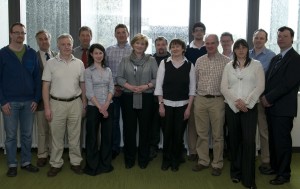 Some €200,000 is being invested in a new fund to support a variety of research projects being undertaken by staff at IT Sligo, underpinning the Institute’s commitment to research.
Some €200,000 is being invested in a new fund to support a variety of research projects being undertaken by staff at IT Sligo, underpinning the Institute’s commitment to research.
The new Research Capacity Fund will be distributed over a three year period; €80,000 was allocated during the academic year just ended and a further €60,000 will be paid over each of the next two years.
President of IT Sligo, Professor Teri Scott, said that research is the ‘lifeblood’ of any higher level education institution; “This new fund is further sign of our commitment to building research capacity in the Institute and in the region. Our Research & Innovation strategy focuses our efforts on building on expertise in key areas that will provide dividends for the North West region. The success achieved by our students in the Microsoft Imagine Cup this summer is a sign of what we are doing right in IT Sligo and we are excited about the opportunities presented through this very significant achievement.”
Dr John Bartlett, Head of Research at the Institute, said that such a significant allocation, underlines the importance the institute places on its research endeavours. He added that he was confident that as a direct result of these grants, multiples of the allocation would return to the IT from other funding sources, both national and international.
Lecturer Paul Powell who is involved in two of the research projects to benefit from the fund this year, said it will help finance equipment and travel. He is supervisor on a ground breaking biodiversity project which will involve the use of mobile phones to identify and track species of butterfly. Mr Powell, a Lecturer in Computing in the Department of Information Systems in the School of Business and Humanities, explained that postgraduate research student James McNamara will use a smart phone while literally out in the field, to locate and identify species using information downloaded from a cloud computing platform to assist in identifying the species. James McNamara is one of the students who were successful in the Microsoft Imagine Cup Competition.
Information gathered about the species will also be transferred from the smart phone to a cloud computing platform or giant processing and storage facility. Microsoft’s Azure platform is used in the process. The system will then allow web based access to information about the species such location and distribution. “This project has important implications for biodiversity tourism which is going to be very important in Ireland,” explained Mr Powell.
Both Mr Paul Powell and Dr Tony McCabe from the School of Science are also involved in another successful project which involves the creation of a virtual science laboratory and will see students using computer games to familiarize themselves with science lab environments while carry out virtual experiments as part of a computer game, before entering the real thing. This project has implications for online learning, a key part of IT Sligo’s Learning and Teaching strategy.
The research will incorporate a Microsoft Kinect device together with heads up display glasses to give a more immersed game playing and learning experience. The researcher on this project is postgraduate student Neil Gannon.
The Research Capacity Fund is designed to facilitate staff in their research activities and to focus capital and human resources on key areas of research, including those allied to national priorities. Grants can be used to fund equipment, employ research assistants or permit researchers to attend national conferences to present their work.
Image Caption: Staff who were successful in achieving funding under the Research Capacity Fund this year, pictured with President of IT Sligo Professor Terri Scott; Registrar, Dr Brendan McCormack; Head of Research, Dr John Bartlett; and Head of School of Science, Dr Jeremy Bird.